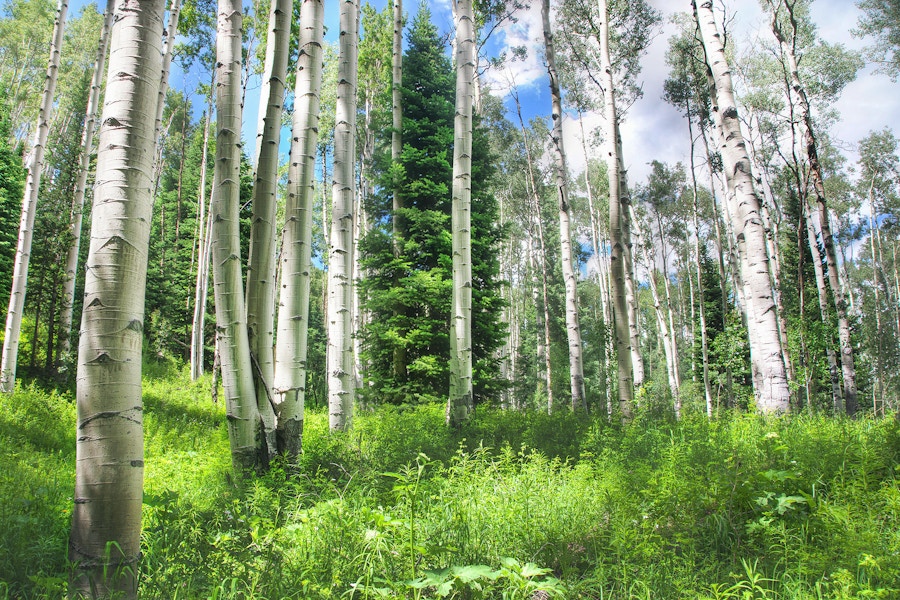I love trees. I always have. The creative endeavors of God offer profound insight and wonder into the spiritual life. There is much to gain by interacting with, reading, and studying God’s art: the book of nature, the second great book.
I think God must like trees as well, these little signposts, scattered all around us. The Bible is full of references comparing our spiritual journey to trees, Genesis, Numbers, Deuteronomy, Psalms, Proverbs, Isaiah, Jeremiah, Daniel, Ezekiel, Hosea and Micah. Jesus talked about cutting off branches and Paul wrote about grafting. And then that haunting story of Nathan being seen and known while sitting under a fig tree.
I’ve developed a little habit when I give a talk. I like to start with a tree metaphor, digging into what can be learned about our lives with God from trees. I’ve been asked to compile some of the stories. And so, in this essay, I’d like craft a narrative arch about trees and our life with God.
Growing Roots
Today in Michigan a wispy snow is dancing about, gently resting on the knotted and mangled branches. I sometimes feel sorry for trees in the winter. Those once brilliantly vibrant canopies, pulsating with new life are now laid bare. Naked. Exposed. Subject to brutal wind and biting cold. If I didn’t know any better, I would think they were dead. Yet, they are anything but. Deep in the dark recesses of the earth something very wonderful is taking place. They say trees do their most growth in the winter as their roots dig deep, plumbing the depths seeking out the nutrients they need to survive. Desperate. Longing. Breaking through the frozen earth, clay, and rocks. And so, I think it is with our own personal winter seasons, when our protective facade no longer covers. Those times when all seems lost; when we’re wounded and confused, a frigid storm rages about and we ache and suffer, helplessly exposed like a raw nerve. Yet, it is during these seasons we grow the most – just like the trees.
There is much to say about the transforming power of suffering. Most of the qualities of who I am that I most value were born out of suffering.
I can’t help but wonder if we really had a clear picture of the redemptive power of suffering and its eternal significance that we might embrace it rather than run away. We are faced with these crossroads in life — of withering back into numbing practices, isolation, or despair, or accepting and maybe even embracing what life has offered, thus driving our roots deeper into greater mysteries of God.
We learn to rely on the prophetic promises of the psalmist. We imperfectly cling to God in the short and long winters that find us, growing deeper into grace and love. As with the tree, our roots are so often formed in the dark and bitterness of winter. The fruit of God in our lives, which spring reveals with buds and blossoms, is the result of a deep inner life, one that is forged in trials, suffering, and pushing through the bitter cold of winter.
In the winter we learn to accept the seasons of life. We learn to live life on life’s terms by embracing that which we cannot change, and instead allowing it to deepen us. And as our roots go deeper, we can be ever sure that God is in our growth, going ahead, kneading the soil, fully committed to the redemption of our struggle and our transformation into the likeness of Jesus.
I should note that for so many throughout history, this life did not bring significant relief from suffering, and the fruit of their trials was not to be seen this side of eternity. It will be the same for many of us living today. Take great assurance that God will not waste our burrowing into him, that our present condition will catapult us into glory upon glory, that who you are becoming today will have great eternal significance. And in 10,000 years our present horrors will be as a fleeting moment.
There is something so appealing about the cultural lie that if I could be more, do more, then things will be okay — the grand illusion of control. I’m not sure where I got the idea that I’m entitled to have an easy life, free of suffering and struggle. But it too is an illusion, one I often cling to, an idol of sorts.
I remember watching someone desperately pour out a question to my dad: “What do you do when your pursuing God feels empty and dry? What do you do when you’re lost in pain, mystery, and God seems completely absent?” Very simply he replied, “The same thing you do when all is going your way. You remain faithful and obedient.”
Tree Rings
For the tree, winter marks a passing year. Expanding its girth with a ring around its base. Not only do new rings provide strength to support, the new growth of branches and foliage, the story is locked into its very fiber. The ring holds its history; the climate it endured, the seasons of scarcity and abundance, the narrative of sunlight, water and fire forever marks the tree.
And so it is for us, and we take time to remember where we’ve been and where we are going. Like Joshua arranging stones from the Jordan to mark the movement of God in the life of the people, we remember. We learn and we share with others. Tattooed in our hearts are the stories of God’s work in our lives.
Community
High in the Colorado mountains where the air is thin and the snows are heavy lives a community of singing trees: the quaking aspen. If you listen carefully you just might hear the poetic chorus of their leaves humming in the wind. Yet this white barked mountain choir depends on each other for more than music, aspen groves share a singular root system. The life and health of one affects the whole, similar to us in the spiritual life. I’ve come to believe that we need each other in ways often unseen. When you hurt, the rest hurts. And when you walk in new life, it feeds and nurtures others in profound ways. Contrary to popular belief, we are nothing close to islands unto ourselves. Of course we see our interconnectedness as humans in global and environmental affairs, but in God’s Church our connectedness is paramount. It is no coincidence that Paul referenced us as a body, interconnected and interdependent. This is God’s design for his children. The spiritual life is highly personal but not private.
Community by its very nature takes time, lots of time. It’s only through seasons after seasons of living life together, struggling, suffering, rejoicing and addressing conflict, that a deep Christian community is birthed. It’s when we know each other, the good and bad, it’s when it’s no longer fun, exciting and safe, yet we choose to continue to do life together and remain committed to a shared vision. Much like a grove of aspen is years in the making the real fruit of life together cannot be fully matured in just a few short years. Go pour into some people for the next twenty years and we just may find our lives hum together with great beauty. Of course our ever-increasing mobile society creates many challenges and we all have to work with what we have.
Spring
Growth is ever happening in the life of a tree. There is nothing stagnant about it; it is either gradually dying or slowing being renewed.
I so love the gentle shift of spring, the smell in the air, the newness, and promise of what’s to come. Like most growth for us, it’s ever so gradual; we never really know it’s taken place until it’s already happened.
I often look in on my trees toward the end winter. I examine those brittle and flimsy branches for the soft bulge of new buds. The tree anticipates God’s inevitable calling forth of a new season, expectant with regeneration, that will soon no longer be able to contain its enthusiasm. In one moment the time comes and the new life is liberated with the bursting forth of green. Out of the hiding it shines with radiance and glory, fully obeying the beautiful will of the Father.
And so we are like the tree. Our winter labors in time reach fruition. Our growth is a slow and natural process, a work and movement of the spirit. We can’t force or will fruit into being. Yet by submitting and laying our everyday ordinary lives before God, offering our time, energies and lives into the care of God, in due time our fruit matures season after season. Spiritual formation is not about us finding the secret mechanism to make God work as if we could pull a holy lever for blessedness. No, relationships don’t work like that. The tree doesn’t will its fruit into being, nor can we. It is a natural outgrowth of life with God, just like the natural process the sun, water, nutrients and the grace of God working the wonder of life. The tree obeys and receives all that God gives. We want so badly to be good people, empowered to love God and others well. Yet, our resurrection into Christlikeness is a work of God. It’s about grace. Life from death. No system. Our fruit is a gift from God.
I was recently walking through the woods and encountered the most beautiful smell. Searching for its source I stumbled upon a blossoming cherry tree. Its smell radiated out. It could not help but infect the air with its wonder. Much like the cherry tree our deep life with God cannot be contained and the fragrance of God’s grace fills the spaces we find ourselves in.
Our world is completely surrounded by God’s little creative projects, the trees, flowers, birds and rocks in their own way proclaiming God’s wisdom, goodness and glory. There is much for us to learn. As spring will soon be upon us and green will invade the land, what a wonderful time to practice the discipline of study, prayerfully and playfully exploring the beauties and mysteries of God and all that his art has to teach for the living of our days.
Related Podcast
Photo by Chris Ford via Flickr.
Text First Published March 2016 · Last Featured on Renovare.org March 2019


